Iranian Turban Flippers 'Twisting Lion’s Tail': Cleric Lawmaker
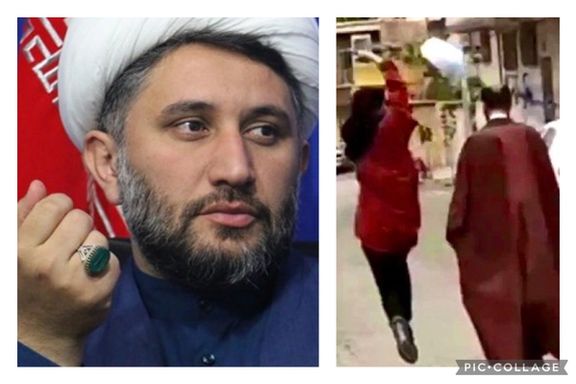
An Iranian member of the parliament says those who toss the turbans of clerics in Iran will see the result of their act as they are “playing the lion’s tail.”

An Iranian member of the parliament says those who toss the turbans of clerics in Iran will see the result of their act as they are “playing the lion’s tail.”
Mohammad Taghi Naghd Ali said the turban-tossing protest movement in recent weeks is a “conspiracy of the devils.”
“Clergymen may bear with it and be patient, but those who play with the lion's tail must be aware they would face the music,” noted the representative of Khomeini Shahr in the Iranian parliament, not elaborating further.
Tossing the turbans of clergymen as they are walking in streets is now part of the current wave of antigovernment protests across Iran, which started as a reaction to the death of 22-year-old Mahsa Amini in custody of hijab police. Younger Iranians tired of government attempts to force them to observe the mandatory Islamic dress code and a restricted lifestyle, began protests and disobedience in mid-September.
The phenomenon has forced many clerics to tie their turbans under their chins or use other head coverings to keep them on their heads as they walk in the streets.
This new addition to the ongoing protests has caused a stir among regime officials and has even made Iraqi Shia cleric and politician Muqtada al-Sadr worried that the trend may spread to his side of the border as a form of protest to Islamic autocracy. He released a statement to condemn the act after many Iraqi young people started to dare their friends on social media to flip some turbans.
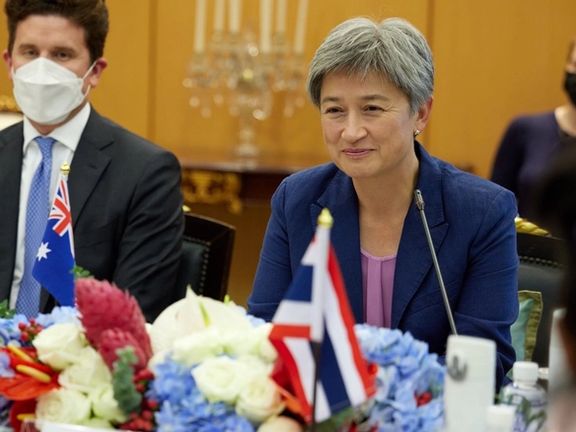
Australia’s foreign minister Penny Wong has condemned the deadly and disproportionate use of force against protesters in Iran.
In a statement on Thursday, Wong said the Australian government has been “alarmed” by reports that hundreds of people have been killed and many more injured, including dozens of children, as a result of the “heavy-handed” measures Iranian authorities have implemented to crack down on ongoing protests.
She added that Australia supports the right of the Iranian people to protest peacefully and “calls on Iranian authorities to exercise restraint in response to ongoing demonstrations.”
“Iran's human rights record has been a longstanding and serious concern for Australia, and we have repeatedly raised our concerns with Iran in Canberra, Tehran, and multilateral forums,” she went on to say.
She also reiterated that Australia joined Canada and New Zealand in expressing grave concerns about the situation in Iran to the United Nations Security Council, including Iran's position on the UN Commission on the Status of Women.
“Australia stands with Iranian women and girls in their struggle for equality and empowerment, and we will continue to call on Iran to cease its oppression of women. We are committed to promoting gender equality, women's empowerment, and ending violence against women and girls worldwide,” reads her statement.
Earlier, Australian Prime Minister, Anthony Albanese condemned the crackdown by Iranian authorities and urged the Islamic Republic to respect the rights of protesters.
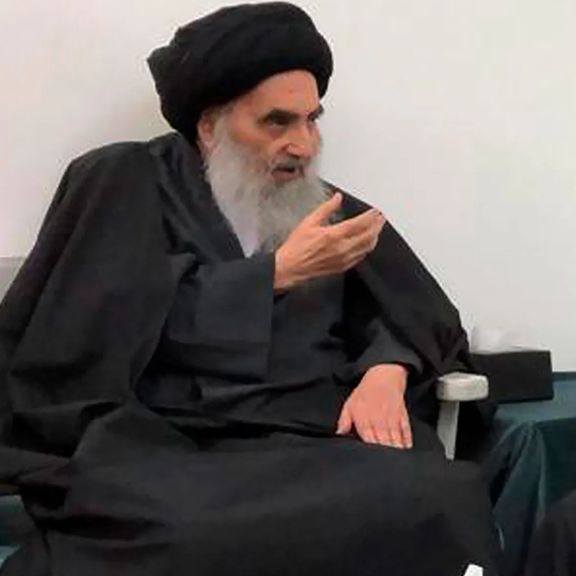
Grand Ayatollah Ali Sistani has dismissed comments attributed to him regarding Iran's protests, saying he does not have a “representative to express his opinion on political issues.”
After the recent statements of Javad Shahrestani, Ayatollah Sistani’s son-in-law, who claimed the nationwide protests in Iran “are not popular at all,” in a short statement on Wednesday the Grand Ayatollah stated that “any political stance” by him will be communicated through his office.
Javad Shahrestani, who introduces himself as the representative of Sistani, had called the Iranian protesters “a bunch of rioters,” saying “it is not clear where they came from and what kind of enemy they are guided by.”
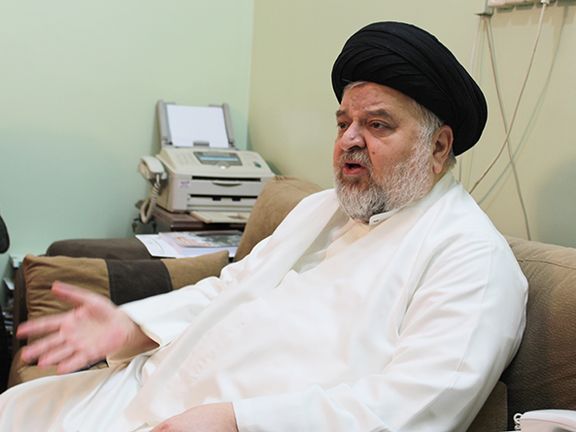
These statements are made in a situation that the Iranian state media and insiders repeatedly call the protesters "garbage", "lewd", "jaunty", "flies", "thugs" and "ISIS" in their speeches against the great movement of Iranian people.
In its latest, the commander of the Army's Ground Forces called the demonstrators "flies" in his speech on Wednesday.
In the past four decades, Iran's government has always called popular protests "riots" and by using the term "enemy", it has accused the West, especially the United States and Britain of leading these protests.
Ayatollah Sistani rarely comments on current political issues. However, Moqtada al-Sadr, another influential Shia figure in Iraq, has expressed concern that opposition to the mandatory hijab in Iran may spread to other countries in the region.
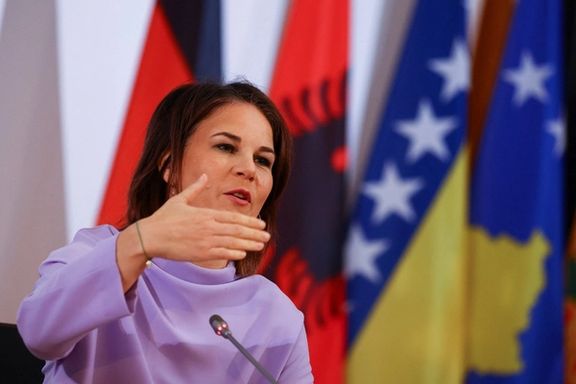
International outcry over Islamic Republic’s crackdown on antigovernment protests is increasing with Germany’s new package of sanctions and measures planned by the EU.
The German parliament – the Bundestag -- passed a comprehensive package of measuresagainst the Islamic Republic following a session on the current situation in Iran on Wednesday. The ratified motion, submitted by a coalition of factions, calls on the government to support the protest movement in Iran and increase pressure on the regime in Tehran.
Describing the current wave of unrest as “the greatest challenge to the inhuman Iranian regime,” the lawmakers said Mahsa Amini’s death, which ignited the current uprising, is just part of “the systematic violation of human and civil rights in Iran for more than four decades, where women and minorities are particularly discriminated against and oppressed.”
“On an unprecedented scale, the Iranian society is protesting against the authoritarian regime, which has completely lost its basis of legitimacy and only wants to secure power with sheer violence,” read the motion, adding that all social classes throughout the country are expressing their frustration against “arbitrary harassment, oppression, a lack of transparency, bad governance, corruption...”
The German MPs also urged the government “to maintain the already increased political and diplomatic pressure on the regime in Tehran” particularly through a resolution over Islamic Republic’s Human Rights situation in the Third Committee of the UN General Assembly and in the UN Human Rights Council. The government should ensure a special session on the human rights situation in Iran and an extension of the mandate of the UN special rapporteur on Iran, they added.
They also voiced their support for further sanctions at the EU level on those responsible for the violent crackdown, including asset freezes and travel bans. Some of their other demands were aimed at supporting NGOs that document evidence of Iran’s state violence and arbitrary arrests, as well as dissident Iranians from the areas of culture, science, media and civil society.
The lawmakers also called for further examination on whether and how the Islamic Center in Hamburg (IZH) can be closed for good, calling it "the hub of the operations of the Iranian regime in Germany.” Germany has already expelled Iranian cleric Soleiman Mousavifar, who was the deputy head of the IZH, from the country for his support for Shiite extremist and terrorist organizations.
Earlier on Wednesday, German Foreign Minister Annalena Baerbock said, "We're not letting up. We stand with the men and women in Iran, and not only today, but as long as it is necessary. We bring their voices to the world. Their names are Mahsa, Nika, Abdolfazl, Mohammad, Omid or Minu. You are not alone."
Announcing that the European Union will seek to adopt new sanctions against the Islamic Republic next week, Baerbock said, "Four weeks after the death of Mahsa Amini, we've imposed EU sanctions against those responsible for the brutal crackdown on the protests in Iran. We are working flat out on the next package of sanctions. Next week we want to adopt it."
Iranian Foreign Minister Hossein Amir-Abdollahian reacted to her marks in a tweet on Thursday, describing them as meddling in the country’s domestic affairs, and warning that Tehran will give a “proportionate and firm” response to such positions. “Undermining old ties has long-term consequences. Germany can choose engagement to address shared challenges or confrontation,” he said.
The European Union already imposed sanctions in mid-October against Iran’s “morality police” and three other organizations as well as 11 officials, including the telecommunications minister, for their role in the death of Mahsa Amini and the crackdown on protests. The new punitive measures have a good chance of being approved by EU foreign ministers at their upcoming meeting slated for November 14.
European Parliament President Roberta Metsola also called on Europe to take a firm stance against the clerical regime, noting that an international investigation and further targeted sanctions will keep the regime accountable.
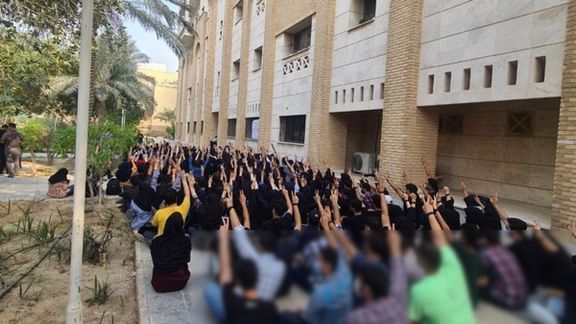
As the Islamic Republic continues expulsion and suspensions, students are boycotting classes and holding sit-ins in various universities across the country.
The Telegram channel of Student Councils Union announced that students at Bojnord University of Medical Sciences staged a sit-in Thursday to protest the illegal suspension of their peers and threats by the authorities.
A group of students at the Faculty of Fine Arts at Tehran University also staged a sit-in to show anger at the killing of Baluch citizens and the suppression of students.
Some others at the University of Welfare and Rehabilitation Sciences in Tehran also announced in a statement that they will boycott all classes.
This week, students in various universities including Sharif, Amir Kabir, Tehran, Esfahan, and Azad University's branches of Central Tehran as well as Science and Research also called for protest sit-ins.
On Wednesday, the Telegram channel reported that 138 students at Gilan University in northern Iran have been suspended for one semester and some 34 others for two semesters.
In an appalling move, Tehran University of Arts announced on Sunday that all drama graduate students will be suspended and cannot take the final exams.
Many students have been arrested since the beginning of anti-regime protests in September following the death of Mahsa Amini at the hand of regime forces. Some are kidnapped by security forces, and often nobody knows their whereabout for days.
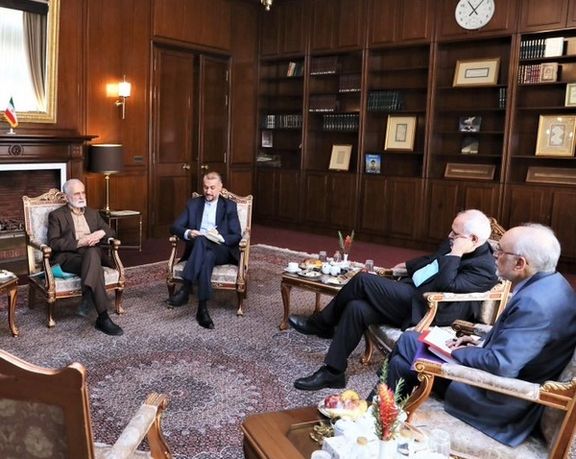
Iran’s Foreign Minister Hossein Amir-Abdollahian says he held a meeting with his four predecessors, including Mohammad Javad Zarif, without disclosing any details.
In a tweet late on Wednesday the Iranian top diplomat said, “in a friendly meeting I hosted the former foreign ministers of the Islamic Republic of Iran Kamal Kharazi, Manuchehr Mottaki, Ali Akbar Salehi and Mohammad Javad Zarif.”
Further he added that “We are determined to accomplish the objectives of the diplomacy in realizing the greatest interests of the nation by relying on collective wisdom.”
However, Amir-Abdollahian did not mention anything about the agenda of the meeting and the issues raised.
Some Iranian dailies, however, called the meeting “an urgent” one not giving any other details.
The meeting comes as negotiations to revive 2015 nuclear deal are in a deadlock, with the United States openly stating that the talks are not its focus at the moment.
The recent protests that have swept the country are having an undisputable impact on the chances of the revival of the JCPOA as it is getting more difficult for Washington and the West to negotiate with the Islamic Republic when anti-regime demonstrators are subjected to a brutal cracked down in the streets.
The United States and its European allies have warned Tehran to respect fundamental human and civil rights of the protesters and are threatening more sanctions.
It seems that the incumbent minister is seeking help from his predecessors to get the regime out of the impasse, but major policies in Iran are set by Supreme Leader Ali Khamenei.